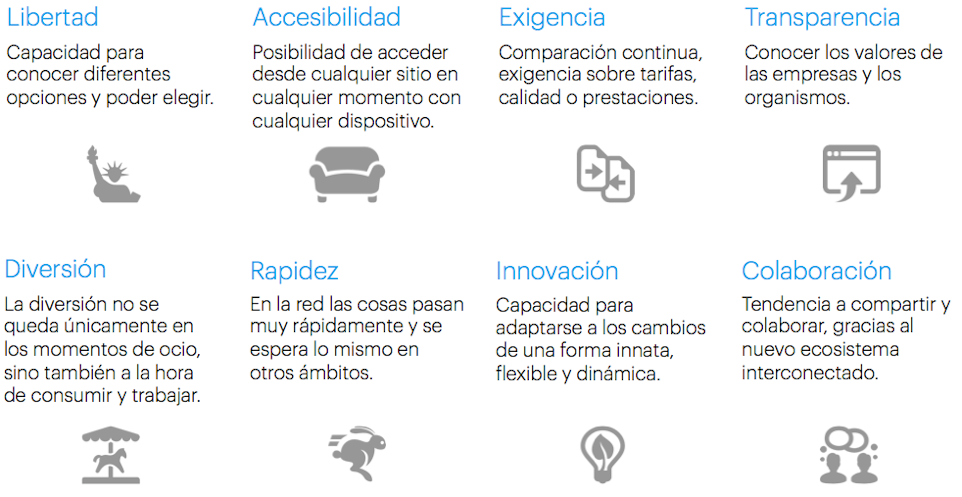Article
The #DigitalHealth challenge

Working towards digital health shouldn’t be a defensive action but rather the chance to lead change and gain a competitive advantage
The mass adoption of new technologies by people is causing deep changes in their behavior when interacting with each other and when consuming or using the products and services offered by companies. Companies, in turn, must adapt their businesses to this new situation in order to remain competitive. This is defined as the digital transformation.
The keys to this change lie in understanding new digital users and their demands as a result of their new digital capabilities:

The digital revolution, however, is having different effects on the sectors that make up the economy in terms of time and intensity. Some have already been radically transformed, while others are beginning the process. At the start of 2016, the health sector continues to be a few steps behind most industries in terms of digital transformation.
Despite the efforts of some of the major industry players, such as public entities, hospitals or some insurance companies, a couple of examples can give us a good idea of the situation. Right now, it is easier for a person in Seville or Bogotá to choose a hotel in Kuala Lumpur than to decide on which rheumatologist to visit in their own city. A person located anywhere in the world can visit websites containing photographs and reviews written by other users, and that person can even opt for hotel alternatives that have appeared thanks to the collaborative economy (swapping homes, renting directly from homeowners, etc.). On the other hand, very few tools are available to help people choose a doctor.
For an additional comparison, everyone would agree that it is outdated to buy a plane ticket from the travel agency down the street, or even by phone or e-mail. However, most people continue to buy their health insurance or request their medical authorizations on paper, over the phone, or via e-mail if they’re lucky.
The good news is that things are starting to change. The systems that allowed us to describe the roles within the health sector are starting to become obsolete. New service models are beginning to appear thanks to the development of devices that make it possible to monitor the vital signs of patients and connect them using applications installed on their smartphones, or thanks to the possibility of connecting providers and patients remotely, they can instantly exchange medical information and additional tests.
Companies must seriously consider the need to make significant progress towards a new health model by adopting the digital culture from the very heart of an organization and to its customers. The path towards digital health should not be a defensive action but rather an opportunity to use new technologies in the field of health in order to lead change and gain a competitive advantage over companies that have not taken the necessary steps.
In order for the transformation towards digital health to take place, health businesses must address three fundamental aspects that will allow them to meet the needs of the new digital users described earlier:
The customer’s digital experience: this consists of improving the customer’s experience at all the points of contact (customer journey) by applying facilitation tools for connectivity. To do so, each company must analyze what exactly its customers want within the new digital age, what customers are already being offered, and what should be offered to customers. Some of the key points could be establishing omni-channel communication with customers, guaranteeing information transparency in terms of professionals or the effects of medications, or being present in social networks.
Digitizing the product: new technologies make it possible to significantly improve the healthcare offering. Some very important aspects will be changes in the care for chronic patients through the use of remote monitoring, improvements to simulation techniques, and on a pharmaceutical level, digital pills that are capable of sending information about the body or treatment compliance (some have already been approved in the EU). However, the development of software and devices has advanced much faster than clinical practices, so the challenge will be to adopt the improvements that truly add value and to invest in developing the most promising fields.
Digital excellence in operations: this consists of striving for operational excellence through the use of digital technologies, primarily by automating business and production processes, and improving workforce flexibility. For a health insurance company, this means eliminating paper transactions, enabling online purchases, facilitating mobile operations for authorizations, and using social networks and big data to improve risk assessments. For a hospital, this could involve digitizing all the records and data exchange processes. For public entities or major service buyers, analyzing the enormous amount of data (known as big data) they have could help significantly improve the overall efficiency of their system.
Digitizing health is an unstoppable process that companies will have to do looking outwards and inwards, with the collaboration of their technological and medical partners, and with a constant focus on customers, who have become the central point of digital health.
